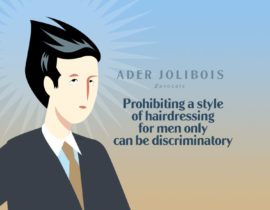- Home
- >
- Social Law
- >
- Disagreement with your Boss: Free Speech or Not?

Can a disagreement with your hierarchical superior come under the right of expression?
Focus on the judgment delivered by the social chamber of the Court of Cassation on September 21, 2022: Expressing disagreement with the directives of your hierarchical superior may fall under the right of expression
Cass. soc. 21 septembre 2022 n° 21-13.045
For the Court of Cassation, except for abuse, the opinions that the employee expresses in the exercise of the right of expression cannot justify a sanction or a dismissal.
Facts and procedure:
The dismissal concerned the employee of a company who during a meeting of “expression of employees law Auroux” had expressed himself on the organization of his work put in place by his hierarchical superior and the resulting workload.
He thus alerted his audience to “the way in which his hierarchical superior asked him to carry out his work, which went against common sense and above all caused him to waste a lot of time and energy, which led to a delay in his other tasks and those of the accounts payable department for the payment of invoices”.
This speech led to his dismissal for simple misconduct. The employee challenged his dismissal on the basis of the right of direct and collective expression recognized by the labor code.
The Court of Appeal ruled that the dismissal of the employee was justified. For the Court of Appeal, during this collective expression meeting, the employee had, in the presence of the management and several employees of the company, questioned the directives given to him by his hierarchical superior, attempting to impose on the director general a public disavowal of the latter. The trial judges held that the occupational physician had noted, two days later, the deterioration in the state of health of the hierarchical superior and concluded that this behavior amounted to an act of insubordination and a disparaging attitude.
Landmarks:
Right of expression and labor code
The right of expression is provided for by the labor code and is thus distinguished from the employee’s freedom of expression, which can be exercised individually in the company, but also outside it.
The right of expression is governed by the labor code, while freedom of expression rests on a constitutional foundation.
Several articles of the labor code govern the right of expression.
According to Articles L. 2281-1 and L. 2281-3 of the Labor Code, in their wording resulting from Ordinance No. 2007-329 of March 12, 2007, employees have a right to direct expression and collective on the content, working conditions and organization of their work. Unless abused, the opinions that the employee expresses in the exercise of this right, cannot justify a sanction or a dismissal.
This right is exercised directly and collectively in the context of meetings organized on the premises and during working hours. This is to ensure that everyone can express themselves, not in an individual employee-hierarchy relationship, but as a member of a working community (Circ. DRT 3 of 4-3-2006).
The methods of exercising the right of expression are defined within the framework of the negotiation relating to professional equality between women and men and the quality of life and working conditions provided for in Article L 2242-1 of the Labor Code (C. trav. art. L 2281-5 s.).
Right of expression and case law:
While the question of the employee’s abuse of his freedom of expression fuels significant litigation, few court decisions specify the limits of the right of expression. However, it must, like any right, be exercised without abuse.
The main questions put to the Court of Cassation:
Did the remarks alleged against the employee constitute a fault of the employee in the performance of his employment contract?
Can the right of expression recognized by the labor code lead to dismissal when it does not degenerate into abuse?
The response of the Court of Cassation: an employee can express himself during meetings organized in the company, including on the work organization set up by his line manager when there is no abuse.
The employee can legitimately give his opinion on the organization of work decided by his hierarchical superior and the resulting workload during a meeting with the management and employees of the company. He thus exercises his right of direct and collective expression, and cannot be sanctioned for this reason.
In this case, no abuse had been noted. The comments made by this employee during this meeting had been measured and appropriate. This employee had expressed his disagreement with the way his supervisor asked him to perform his work in moderate terms and by continuing to comply with his directives.
Related Posts
Recent Articles
- Faced with crises and challenges, let’s dare to transform the social business model
- Prohibiting a style of hairdressing for men only can be discriminatory
- The obligation of balanced representation of women and men at work
- Sexist joke: a limit to freedom of speech?
- Disagreement with your Boss: Free Speech or Not?




